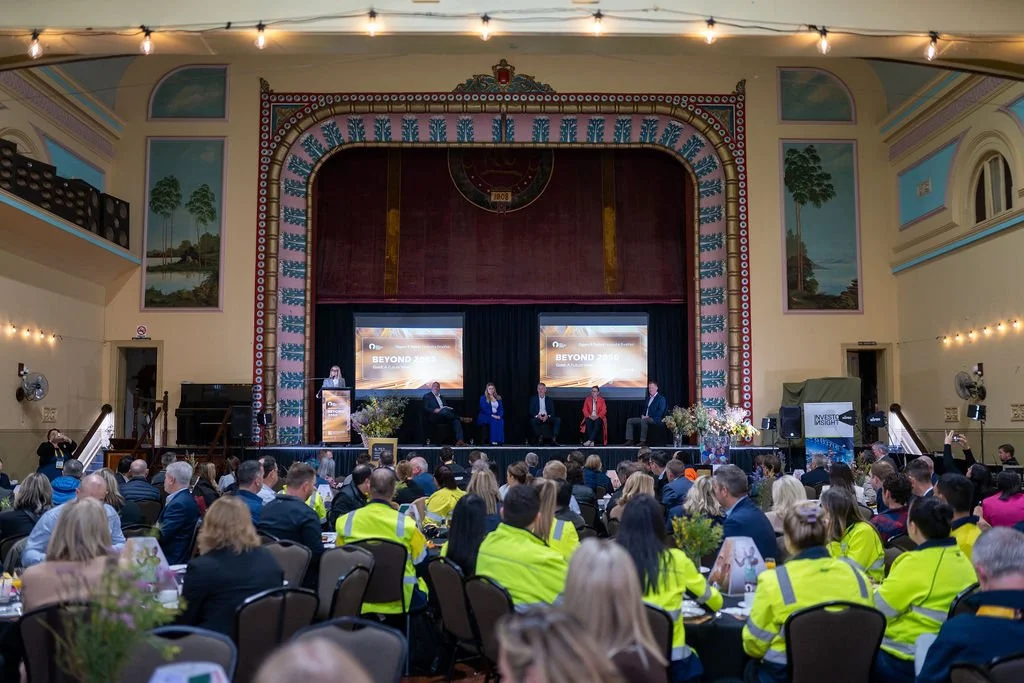What will a gold mining operation look like in 2050? The answer depends on both the technologies developed and their adoption by the workforce, according to a panel of industry leaders
From L/R: Purple Director Peter Klinger, Gold Industry Group Chair Kelly Carter, Gold Fields CEO Mike Fraser, Evolution Mining Geologist Grace Cruise, idoba CEO Sarah Coleman, and Northern Star Resources MD and CEO Stuart Tonkin
During the 2024 Gold Industry Group (GIG) Leadership Breakfast on August 6, over 200 delegates gathered at the Kalgoorlie Town Hall to hear a lively panel discussion on gold’s 25-year outlook.
The panel featured notable industry leaders, including Stuart Tonkin, Managing Director and CEO of Northern Star Resources, Mike Fraser, CEO of Gold Fields, Sarah Coleman, CEO of idoba, and Grace Cruise, Geologist at Evolution Mining.
Stuart Tonkin expressed optimism about the industry's future, particularly with the goal of achieving net zero emissions by 2050. He emphasised the potential for sustainable, renewable, and affordable energy, highlighting its transformative impact on technology and mining operations.
“Think what power can liberate, all this technology, and what it can do. With clean, free electricity there will be a step change,” he said.
“When you look at a beast like KCGM, nearly 80 million ounces have been taken out of that system. There is still more gold in there than has been taken out.”
“I am very confident that is an open pit that will still be operating. And it’s going to be a very significant underground operation.”
“We’re mining at parts per million, grams per tonne, but when the price is right, there will be parts per billion.”
Mike Fraser echoed this sentiment and envisioned a future with remote management and robotic mining. He also stressed the need to effectively navigate the complexities of the transition to new technologies.
“You can almost imagine a world [beyond 2050] where there are no people on site, and everything is managed remotely. And you have robots mining for you,” he said.
“I do envisage a world where you can essentially buy a mine in a box, and you optimise to the geology with all the technologies available.”
“That will produce a very different set of scenarios. As we deploy technology, we will be able to extract the maximum value from ore bodies. But the real challenge for us is how we manage the transition.”
Mr Fraser said Gold Fields had come a long way in the last 30 years, and that the company stood by its purpose to “create enduring value beyond mining.”
“There is no reason why this industry can’t continue to make massive economic and social contributions to the global world. I think this is what socially responsible miners will continue to do,” he said.
Sarah Coleman emphasised the importance of embracing new technologies while acknowledging the challenges of implementing and adopting them effectively.
“Everyone wants to transform, but no one wants to change,” she said.
“We’ve had a lot of invention, and there is a lot of invention to go, but we don’t put enough effort into getting the adoption right.”
“I did a study on one of the large automation rollouts, and they spent $350 million on the technology and $5 million on the rollout, and zero on changing the people and process side of things.”
“We have [traditionally] been able to segment the value chain in these digestible chunks, but we can optimise these further.”
“We’re heading into a world where it is cost, volume, quality, energy, emissions, water, and social - those levers then become far too great for us as humans to cognitively comprehend.”
“Technology will help us support that, but there is a balance between the technologies of the future and the adoption today.”
By 2050, Ms Cruise will likely be the only panelist still in the workforce. For young people considering a career in the gold industry, the pace at which technology is advancing creates many unknowns in terms of what skillsets will be required.
Ms Cruise emphasised the importance of adaptability and continuous learning for individuals considering careers in the gold mining industry.
“You need to be able to adapt and you need to be able to learn. What they show you at university is nothing like what it is like within the mining companies,” she said.
“I love engaging with people and being face to face. In the last 10 years, there has been so much change to online working and that is going to keep going and going, but we are actually starved for people attention and engagement.”
As millennials become the dominant generation of the workforce, Ms Cruise said there would be a much greater focus on addressing social issues, but that the fundamentals of a good worker and a good company culture remain the same.
Overall, the panelists shared an optimistic and exciting collective vision for the industry's future, recognising the significant role of technology and the need for adaptability and skill development among future workforce generations.



















































































































